Iran’s State TV Switches Ronaldo’s Words With Hateful Comments About Israel
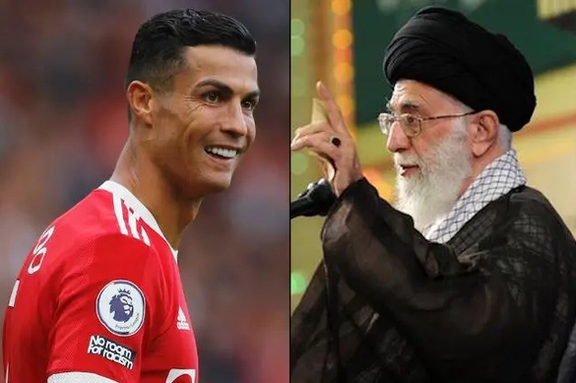
Iran’s state broadcaster has put a false voiceover on a video of Portuguese football star Cristiano Ronaldo, attributing hate speech about Israeli fans to him.

Iran’s state broadcaster has put a false voiceover on a video of Portuguese football star Cristiano Ronaldo, attributing hate speech about Israeli fans to him.
In the video, originally published in 2016 in support of the Syrian children suffering in the country’s civil war, what Ronaldo really says is calling on the kids not to lose hope. “I am a very famous player but you are the true heroes.”
In the version the IRIB broadcast, Ronaldo’s voice is dubbed in Persian as saying that he cannot tolerate the Israeli spectators as they are the most hated for him, adding that he does not exchange his jersey with assassins. The Islamic Republic’s state channel also referred to a hoax back in 2013 as true, that falsely claimed Ronaldo refused to exchange his t-shirt with an Israeli player after a match with its national football team.
In Reality, the video showed a Portuguese player who had swapped his shirt with an Israeli player walking past Ronaldo, but some anti-Israeli media reported it as if Ronaldo refused to exchange his shirt. The Portuguese player is easily recognized from the dark colored shorts he is wearing.
The state broadcaster aired the fake video about a month after Supreme Leader Ali Khamenei criticized Ronaldo’s fame among students in Iranian schools. Khamenei compared Ronaldo with an Iranian scientist, Saeed Kazemi Ashtiani, the head of Iran’s Royan Infertility Research Center who died in 2006, saying that students know Ronaldo but not Ashtiani.
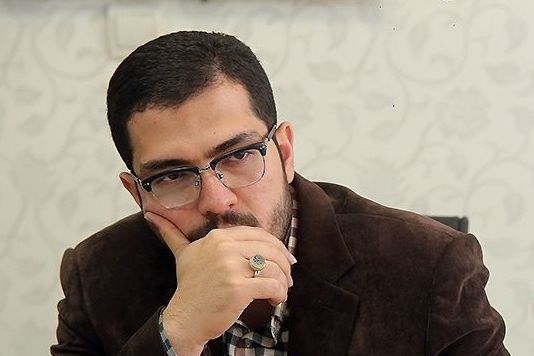
Speculations continue in Iran amid a news blackout over IRGC's arrest of admins running three of its own social media news channels on the Telegram app.
Iranians with some knowledge of the affair have reported that the counter-espionage unit of the IRGC arrested several journalists in Tehran, most notably Ali Gholhaki, a hardliner, conservative investigative journalists with a proven access to insider information from the Iranian establishment.
The arrest stirred a controversy on social media as various people with knowledge of personalities involved gave different accounts of Mr. Gholhaki’s background, performance and character. Iranian journalist Ali Maliki wrote in a tweet that Gholhaki’s arrest sounded odd as he was an example of journalists who are linked to Iran’s power centers.
Another Iranian journalist, Mojtaba Purmohsen quoted a post published on the hardliner Ammarioun channel on Telegram and wrote that the reason why Gholhaki was arrested was that he had disclosed Israeli infiltration into the IRGC Intelligence Organization.
Another netizen who introduced himself or herself as Emilia, wrote in a Twitter post: “If I were a spy I would have wanted to look like Ali Gholhaki and other hardliner journalists or even some of the Iranian lawmakers if I did not wish to be recognized easily.” Emilia was only one of the social media users who pointed out that spies usually chose to be disguised as hardliner Muslims.
An Iranian teacher, Siavash Khoshdel, tweeted: “Gholhaki has been arrested. But has he been detained legally? Even if yes, has there been a trial or a verdict? No. And there is no reason to believe that there would be a fair trial for him.”

In an interview with Iran International TV, analyst Mehdi Mahdavi-Azad quoted lawmaker Malik Shariati as having said that Gholhaki was arrested by the IRGC’s Counter Disinformation unit. “If this is true, one can say with a degree of certainty that Gholhaki was a member of The IRGC or Basij militia or he was in charge of a major IRGC project,” said Mahdavi Azad.
Mahdavi-Azad added that several Iranian journalists including Saba Azarpeik and Massoud Kazemi have said that Gholhaki was involved in fabricating incriminating evidence against them. The analyst argued that if this claim is true then Gholhaki was in one way or another cooperating with Iranian security-intelligence forces.
Mahdavi-Azad said that in the past Ali Ghazali the editor of Baztab news website and Mohammad Hossein Rostami the managing editor of ultra-conservative website Ammarioun had been arrested on similar charges, and they are still in jail. Similar arrests including that of investigative journalist Reza Golpour, said Mahdavi Azad, happened at a time when there was an internal conflict in the IRGC, and one part of the corps wanted to silence another part.
The analyst said that probably disclosures about parliament Speaker Mohammad Bagher Ghalibaf’s family luxury shopping trip, and the leaking of tapesincluding statements made by former IRGC commander Mohammad Ali Jafari as well as leaking another tape including remarks by Mehdi Taeb, the brother of IRGC Intelligence Chief Hossein Taeb could be reasons why Gholhaki was arrested. Interestingly, all of these controversies involved Ghalibaf.
Meanwhile, as Twitter user Anvari wrote in a warning to other conservative journalists and Twitter users: “Ali Gholhaki, a well-known conservative journalist has been arrested by the IRGC Intelligence on charges of espionage. Let it be known that the IRGC has no mercy even for you my dear friend.”
There is still no news about Gholhaki’s whereabouts or about the names of others who may have been arrested.
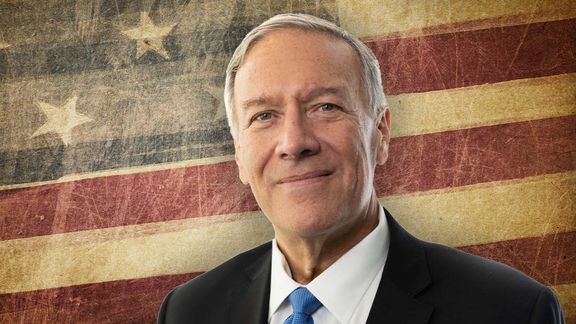
“Banquet of Murderers” read the headline on Iran’s Fars news affiliated with the IRGC, reporting on an Al Arabiya interview with former US Secretary of State Mike Pompeo.
Although the report on Fridaywas not distorted and summarized Pompeo’s remarks in Persian, but the headline referred to his role in the targeted killing of Iranian military and intelligence strongman, Qasem Soleimani by the United States in 2020.
The headline was also a broadside at Saudi Arabia and its media, Al Arabiya, for the killing of Jamal Khashoggi in 2018 in Turkey. “Banquet of Murderers: Soleimani’s Killer Is Guest of Khashoggi’s Murderers,” said the full headline.
In the interview, Pompeo called the Iranian regime “evil theocrats” who aim to destroy the US and Israel. He also sharply criticized President Joe Biden’s policy toward the Islamic Republic.
“We know who the Iranian regime is. These are evil theocrats intent on the destruction of the nation of Israel and the United States of America. We ought not to be negotiating to figure out how much money to give them in exchange for an ephemeral promise for just a moment to slow down their enrichment and weapons program,” Pompeo told Al Arabiya.
The Trump administration withdrew from the Obama-era nuclear agreement with Iran, supported by Israel and Saudi Arabia, two countries along with the United Arab Emirates who have been concerned about Tehran’s nuclear and missile programs.
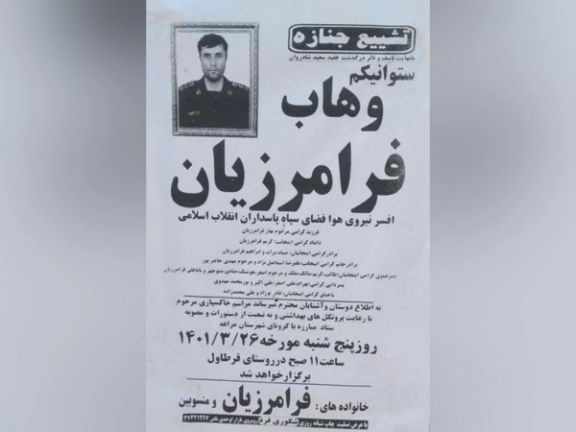
Less than a week after Iran announced the death of two IRGC Aerospace Force officers under mysterious circumstances, another officer of the unit died, unconfirmed reports say.
The officer was identified as Vahab Faramarzian and reportedly died in Maragheh in East Azarbaijan province.
According to photos of his obituary published on some secondary websites, his funeral service was held on Thursday in the village of Qartavol, near Maragheh.
The Revolutionary Guard has yet to comment on his death.
Iran International quoted an informed source as saying on Monday that the two IRGC Aerospace Force officers whose deaths were announced Sunday were engaged in "developing arms for Lebanon's Hezbollah,” adding that Ali Kamani and Mohammad Abdus, both Revolutionary Guard’s aerospace engineers, "were not killed in accidents" as the Islamic Republic claimed.
The two died in separate incidents in two different locations, but the source did not provide further details about the circumstances of their deaths. What was clear from the information received is that the two officers did not die as a result of a car or work place accident.
Iranian media first announced that Kamani died in a “car accident in line of duty” in Khomein, in central Iran, before news came that another aerospace Force officer had also died in the province of Semnan "on line of duty".
A series of other killings and deaths among IRGC ranks in Iran in recent weeks has led to suspicion that they might have been targets of a secret series of operations, purportedly by Israel’s Mossad.
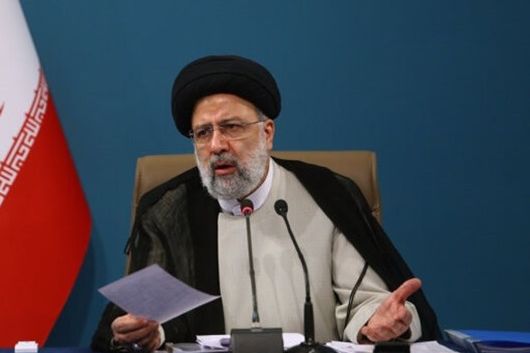
Iranian President Ebrahim Raisi says the United States sends mixed signals by asking Iran for talks and imposing new sanctions at the same time.
Raisi said on Friday that he is “surprised by the Americans who send messages for negotiation and agreement and add to their list of sanctions,” noting that “The world should give us the right not to trust the United States because it breaks its pacts”
He responded to Washington’s move on Thursday to sanction firms and individuals for violating US sanctions by exporting petrochemicals.
The Vienna talks aimed at reviving the 2015 nucellar deal between Tehran and world powers have stalled since March mainly because of Iran’s demand for the US to remove the Revolutionary Guard (IRGC) from its terrorism list (FTO) and the recent missile attacks have shed more doubts on whether President Joe Biden’s administration would take such a step.
In a clear move to pressure Iran on stalled nuclear negotiations, the Biden administration sanctioned Chinese, Emirati and Iranian companies engaged in illicit export of Iranian petrochemicals.
Iranian crude exports declined in May because of Russian competition, as it offers cheaper oil to China. Iran’s income from oil products and petrochemicals was $23 billion from March 2021 to March 2022 and it aimed to boost it to $27 billion.
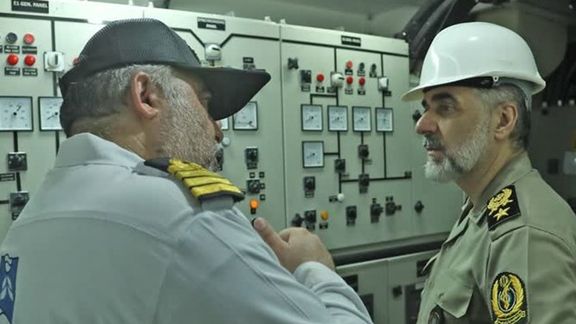
The Iranian defense minister reiterated Iran’s position Friday that the cause of insecurity in the region is the presence of extra-regional foreign forces.
Brigadier General Mohammad-Reza Gharaei Ashtiani made the remarks during his trip to the southern province of Hormozgan, where he visited the Ministry of Defense's naval projects in Bandar Abbas and other cities.
“Our message to the region and the world is a message of peace and tranquility,” he said, adding that “we believe that peace and stability in the region can be achieved with the presence and participation of all countries in the region.”
Iran often uses foreign forces in the region” to refer to the military presence of the United States in the Middle East and the Persian Gulf.
Having been briefed on the projects to build destroyers as well as surface and submarine vessels, Ashtiani said, "Increasing Iran’s military might in all aspects of defense, including land and air, and especially sea, is one of the priorities of the country's defense programs."
Highlighting that Iran's geopolitical position in the Persian Gulf is of strategic importance to the country, he said that the Defense Ministry will update and equip the Navy “in accordance with the regional threats in all its territorial waters.”
On Tuesday, the Israeli defense minister intensified pressure on Iran by calling for a military front with US leadership in the Middle East ahead of a visit to the region by President Joe Biden, saying that Israel and Arab countries that share its worries about Iran should build up their military capabilities under Washington's aegis.
Describing Iran as the most destabilizing force in the Middle East, the new CENTCOM commander in May called for coordinated efforts to confront Iran.